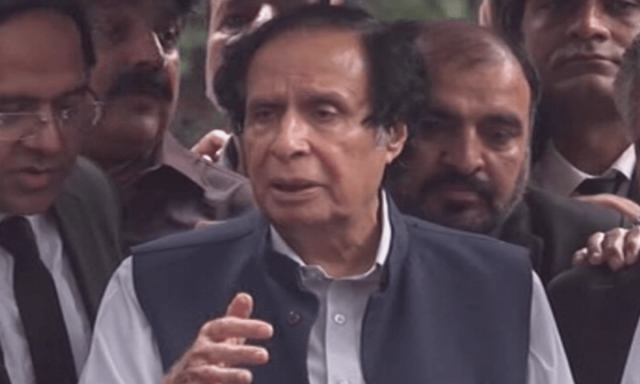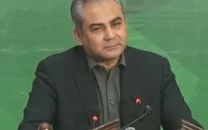SC poll relief for Elahi, other PTI candidates
PTI leader to contest polls from PP-32 in Gujarat only; withdraws papers from other constituencies

The Supreme Court on Friday overturned the rejection of PTI President Chaudhry Parvez Elahi’s nomination papers, ordering the addition of his name and electoral symbol to the ballot papers for PP-32 Gujrat after which the former Punjab chief minister withdrew his candidacy from all other constituencies.
The top court also allowed PTI’s Tahir Sadiq to contest the election for NA-49 Attock, Sanam Javed for NA-120, NA-119, and PP-150, and Shaukat Basra for NA-163.
The greenlighting of Elahi’s electoral pursuits come as the PTI has once again found solace in the SC, as the nomination papers of six party candidates, initially rejected by various judicial forums, have now been accepted.
Since the controversial January 13 order, which upheld the ECP’s decision to declare PTI's intra-party elections as illegal, supporters of the party had been grappling with disappointment and a sense of hopelessness.
The order had cast a shadow of uncertainty over the PTI's participation in the upcoming general elections.
In the wake of this setback, PTI's loyalists were despondent, fearing an uneven playing field in the impending polls.
However, a recent development saw PTI withdrawing its contempt petition from the SC against the ECP.
This move suggested a renewed trust in the legal process, with PTI opting to address its grievances through established channels rather than confrontational means.
The former Punjab chief minister’s appeal against the rejection of his nomination papers was taken up by a three-judge SC bench comprising justices Mansoor Ali Shah, Jamal Khan Mandokhail and Athar Minallah.
Elahi, currently detained at Rawalpindi’s Adiala jail, had submitted his nomination papers from NA-59, NA-64, and NA-69 as well as from PP-23, PP-34, PP-32, and PP-42 for the elections.
Read Elahi says he stands firm with Imran amidst political turmoil
A silver lining
PTI has recently encountered two setbacks. Firstly, it faced the deprivation of its election symbol, and secondly, Justice Ijazul Ahsan, who played a crucial role in providing relief to PTI in various cases since the Panama case judgment, resigned. Justice Ahsan was poised to be the next chief justice of Pakistan.
Despite these challenges, the SC has allowed six PTI candidates to participate in the upcoming elections. Initially, their nomination papers had been rejected by returning officers, elections tribunals, and high courts.
Even the former chief minister, Chaudhry Pervez Elahi, has been permitted to contest the general elections. Interestingly, different benches have extended relief to various PTI candidates.
In another development, a three-judge bench led by Chief Justice of Pakistan (CJP) Qazi Faez Isa has granted pre-arrest bail to Sanaullah Masti Khel, allowing him to participate in the elections.
Another three-judge bench, led by Justice Syed Mansoor Ali Shah, granted relief to Chaudhry Pervez Elahi, Tariq Sadiq, and Umar Aslam.
Similarly, in a separate decision, Justice Munib Akhtar permitted PTI candidates Sanam Javaid and Shaukat Basra to participate in the general elections.
Sanam Javaid, who has been in custody since the May 9 incidents, securing the nomination acceptance might pose a setback for anti-PTI forces. She is set to compete against PML-N leader Maryam Nawaz.
A divergence of opinions is evident among SC benches regarding whether absconders should be allowed to contest elections. Two benches are urging the ECP to ensure free and fair elections. They emphasise that the ECP and returning officers (ROs) should facilitate elections rather than impede or create obstacles for contesting candidates.
Within PTI ranks, there is a level of mistrust toward certain superior court judges due to various reasons. However, some judges from superior courts are viewed favourably by PTI leaders.
It is worth noting that a faction of judges believes that courts should not be used against any political party, similar to the approach taken in the 2018 general elections when PML-N was targeted by the SC led by ex-CJ Mian Saqib Nisar.
Judges with a similar perspective had directed the ECP to ensure a level playing field for PTI. Additionally, bail was granted to Imran Khan and Shah Mahmood Qureshi in the cypher case.
However, PTI has not yet filed a review petition against the January 13 order. With general elections approaching, a contest is unfolding between PTI and anti-PTI parties, as well as powerful circles.
The credibility of the top court has already suffered damage following the January 13 order, where PTI is being denied the opportunity to obtain an election symbol for the upcoming general elections.
Nevertheless, the role of the SC in relation to PTI is not yet concluded.
‘Elections soul of democracy’
In its verdict, the Supreme Court emphasised that at the heart of a thriving democracy lies the fundamental process of elections, an embodiment of the democratic principle that power should be vested in the hands of the people. “And at its core, democracy is all about participation,” the verdict read.
It said that the elections offer a structured and equitable way for citizens to participate in the democratic process and express their preferences for leaders and policies. “The legitimacy of a democratic government hinges on its reflection of the people's will, and this is only possible through widespread and inclusive participation of the candidates and voters in the election process,” it added.
The verdict pointed out that the pro-enfranchisement policies ensure that every eligible citizen, irrespective of his or her background, has the opportunity to vote, thus reinforcing the democratic tenet of equal representation.
The threat of disenfranchisement by way of an improper rejection of nomination papers looms large in a democracy, which may undermine the fairness and integrity of the electoral process, it noted.
“A democratic society committed to fairness must actively combat disenfranchisement, ensuring that all voices are heard and valued in the political arena. Inclusive electoral processes contribute to political stability and social cohesion,” it read.
This stability, the apex court stressed, is essential for the long-term prosperity and peace of any society. The vitality of elections in a democracy cannot, therefore, be overstated.
Further, the ‘right to vote freely for the candidate of one’s choice is the essence of a democratic society, and any [undue] restrictions on that right strike at the heart of representative government.’ It is with this approach we deal with and decide upon the issues involved in the present case, the ruling said.
Subsequently, the court approved both Sanam and Basra’s appeals setting aside the decisions of the election tribunals and the subsequent upholding of them by the LHC.



















COMMENTS
Comments are moderated and generally will be posted if they are on-topic and not abusive.
For more information, please see our Comments FAQ